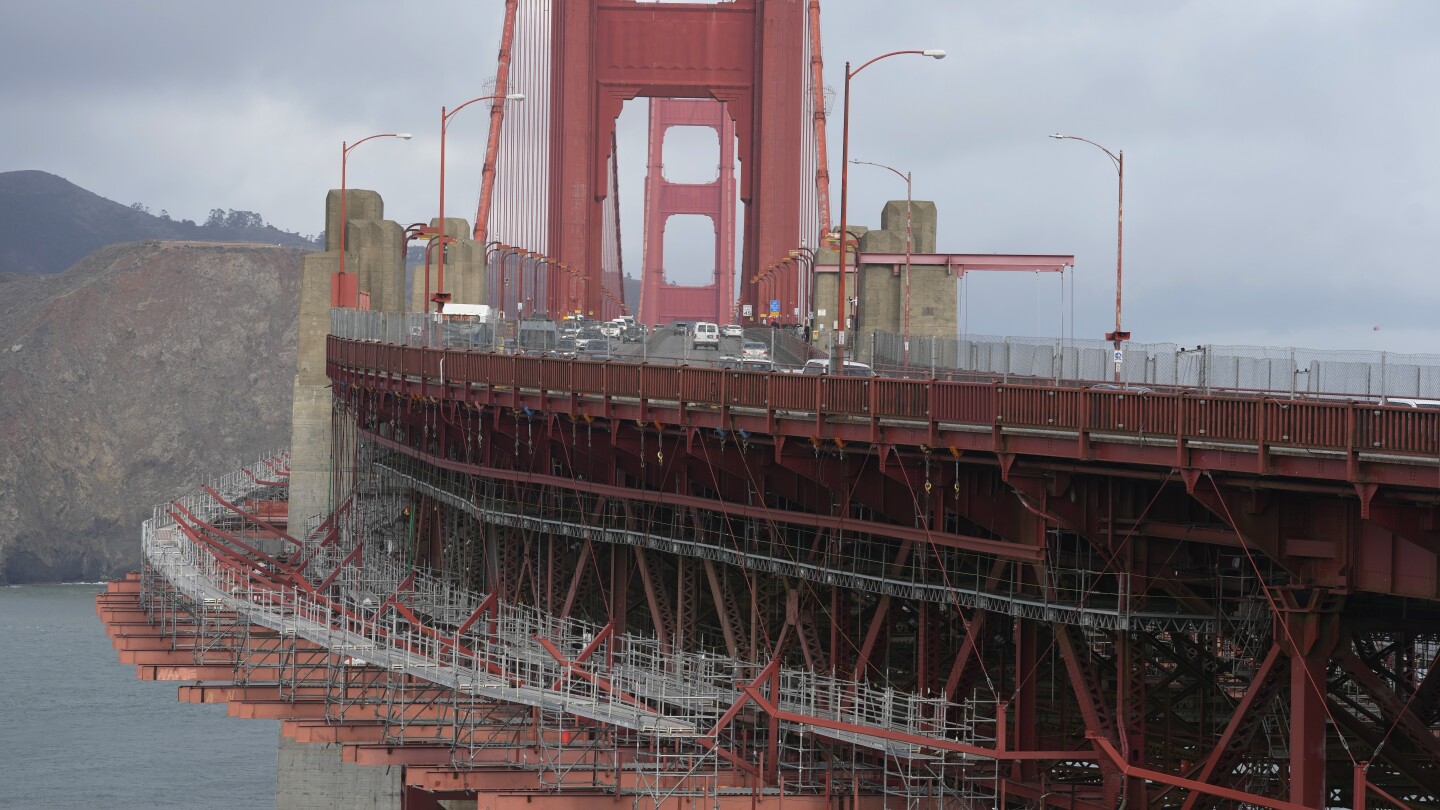Kevin Hines regretted jumping off San Francisco’s Golden Gate Bridge the moment his hands released the rail and he plunged the equivalent of 25 stories into the Pacific Ocean, breaking his back.
Hines miraculously survived his suicide attempt at age 19 in September 2000 as he struggled with bipolar disorder, one of about 40 people who survived after jumping off the bridge.
Hines, his father, and a group of parents who lost their children to suicide at the bridge relentlessly advocated for a solution for two decades, meeting resistance from people who did not want to alter the iconic landmark with its sweeping views of the Pacific Ocean and San Francisco Bay.
On Wednesday, they finally got their wish when officials announced that crews have installed stainless-steel nets on both sides of the 1.7-mile (2.7-kilometer) bridge.
“Had the net been there, I would have been stopped by the police and gotten the help I needed immediately and never broken my back, never shattered three vertebrae, and never been on this path I was on,” said Hines, now a suicide prevention advocate. “I’m so grateful that a small group of like-minded people never gave up on something so important.”
Nearly 2,000 people have plunged to their deaths since the bridge opened in 1937.
City officials approved the project more than a decade ago, and in 2018 work began on the 20-foot-wide (6-meter-wide) stainless steel mesh nets. But the efforts to complete them were repeatedly delayed until now.
The nets — placed 20 feet (6 meters) down from the bridge’s deck — are not visible from cars crossing the bridge. But pedestrians standing by the rails can see them. They were built with marine-grade stainless steel that can withstand the harsh environment that includes salt water, fog and strong winds that often envelop the striking orange structure at the mouth of the San Francisco Bay.
How about instead of nets, we instead install a functioning mental health care system. This has ‘put bulletproof vests on school kids’ written all over it.
Why not both haha. But yes I agree. 2k people killing themselves off this since it’s open is insane
This says 4000 people died by suicide in California in one year. 2k people over almost 100 years isn’t crazy. These nets won’t make a dent in the yearly total.
Damn. We gonna need a lot more nets then
We’ll need nets around every handgun.
The question is how many of those suicides were conducted by jumping off the bridge. And don’t say “they’d just choose another way to end themselves”. Studies and historical evidence shows that making suicide even slightly less convenient to perform actually does save lives. People get fixated on a method that seems easy. When that method is no longer easy, it gives them a chance to not go through with it.
Oh, for sure! I meant to counter the statement that 2k in a 100 years was an insane amount. 4k in one year is insane.
Bulldoze the bridge and exterminate everyone.
No more suicides.
Judge Death approves.
Why bulldoze the bridge if there aren’t any people left anyway? That sounds wasteful.
It’s the moral and environmentally friendly thing to do so.
Now ask yourself if we had proper quality healthcare for this, how many of those 2,000 would still be with us- vs. if we had nets.
I guarantee every one of them would have found another way.
Oh no this is definitely true. I still would like to advocate for mental health services and better access for sure
eh, but making this net prolly just makes them kill themselves in other (perhaps more harmful) places, like off train platforms and using guns
Mental health care, but also better wealth distribution/quality of living for everyone.
Yeah, all the mental health care in the world doesn’t mean jack shit when you’re living paycheck to paycheck your entire life.
Mental health care professionals and their shills will of course say otherwise, though.
It’s always about the money.
All the mental healthcare in the world doesn’t make the world a more acceptable living space.
“Have you tried therapy?”
uhhhh, cheers.
“What colour do you want your dragon?”
Rofl, make it a very hungry one please (that’s s colour, right?).
Actually, make it like an eco terrorist type of thing, just attaching random shit that is causing loss is various habitats & ecosystems around the world. That would be pretty cool, like gleefully look at the news ‘Let’s see what the unstoppable Dragonzilla
destroyedbalanced or rescued today.’
What about door kicking and room clearing during homeroom?
/s
Also reminds me there’s a thing called “social safety net” (that each year becomes smaller and smaller)
The US government is going to do literally everything it can other than provide universal Healthcare until the country collapses.
Wait you’re telling me this isn’t what they meant by safety nets??
The physical, not social kind. “We’ll catch you when you fall… this is not a metaphor.”
I’m pretty sure California is in the process of implementing its own state-funded healthcare system.
It’s the way to do it, just like with legalizing drugs.
For real. It would be interesting to see the average financial depth of the people who attempt suicide in the US.
Nets are cheaper than mental health care.
This reminds me of the time San Francisco decided to do something about it’s human-feces-in-the-BART-escalator-wells problem, not by making public restrooms available to unsheltered folk, but building stupid awnings to keep people from pooping inside. The awnings cost more than the toilets would have and people just pooped on the sidewalks instead. ℹ️🫶🌉😀
Curious since I’m not familiar, how do the awnings prevent this? I went to SF a few years ago and there was a giant pile of human shit every 4 blocks so I’m not too surprised.
They basically close off the street level entrance when the transit isn’t running. The escalators used to be open at the top and closed at the bottom during off hours, making a lovely little private pooping tunnel. The city budget people didn’t GAF about the bio hazard or human dignity issues, they just didn’t like that all the excrement kept breaking the escalators.
Old article from before they implemented them (the article mentions the budget proposal being $4 million, it’s turned into $64 million and counting).
Friedenbach balked at the canopy proposal. “I find it interesting that they’re spending this much money on canopies when they could be using it to keep their bathrooms open.” More so, the money could be used for keeping the high-traffic drop-in centers operational. A few years back, San Francisco, under former-mayor Gavin Newsom’s authority, sought to cut over a million dollars in funding for many of the city’s highest-traffic drop-in centers. The Coalition for Homelessness wouldn’t stand for it. “We’d already seen almost half of the centers close,” Friedenbach recalled, “so we figured out how many pounds of feces the public facilities kept off the street.” Friedenbach and company estimated that the cost of cutting back or getting rid of drop-in centers altogether would be over 58,000 pounds of human feces on the streets of San Francisco.
[…]
Regarding the four million dollars spent on the canopy proposal, Friedenbach said, “You could capture a large amount of feces [with bathrooms], instead of the one shit a night you might be staving off with this.”
This guy Friedenbach sounds like he knows his shit.
Old article from before they implemented them (the article mentions the budget proposal being $4 million, it’s turned into $64 million and counting).
$4 million for one canopy.
FTA:
The canopy, still in prototype form, would be designed and built over the next two years at a cost of almost four million dollars, with the first installation scheduled for 2015 at the 19th Street station in Oakland.
The project is expected to cost $4 million per entrance.
https://www.ktvu.com/news/bart-seeks-public-opinion-about-planned-improvements-for-sf-stations
Odd, I lived in the Bay Area for years and never once saw a pile of human excrement in the city.
It must be a fairly recent phenomenon then. I was there in 2022 and it was quite sad to see the amount of people left homeless around the city.
There’s an increasing number of homeless people in all cities. The streets just aren’t paved in turds like some people apparently love to pretend.
Reminds me of that Bojack Horseman poem.
"But this is it, the deed is done silence drowns the sound. Before I leaped I should’ve seen the view from halfway down.
I really should’ve thought about the view from halfway down. I wish I could’ve known about the view from halfway down—"
It’s a fucking amazing poem and had me in tears the first time I saw that episode.
People falling that 30 feet and being stopped in the act may help them see that jumping, or suicide in general is not the answer.
The weak breeze whispers nothing
The water screams sublime
His feet shift, teeter-totter
Deep breath, stand back, it’s time
Toes untouch the overpass
Soon he’s water bound
Eyes locked shut but peek to see
The view from halfway down
A little wind, a summer sun
A river rich and regal
A flood of fond endorphins
Brings a calm that knows no equal
You’re flying now
You see things much more clear than from the ground
It’s all okay, it would be
Were you not now halfway down
Thrash to break from gravity
What now could slow the drop
All I’d give for toes to touch
The safety back at top
But this is it, the deed is done
Silence drowns the sound
Before I leaped I should’ve seen
The view from halfway down
I really should’ve thought about
The view from halfway down
I wish I could’ve known about
The view from halfway down
Great show.
Love the NIMBY ass “we don’t want effective barriers to keep people from jumping because then we cant see the view, so put in an invisible torture device that will horribly maim and punish people already so far gone they’ve decided to end it” approach. Really sums up San Francisco. Why don’t they just install a fucking Suicide Booth at each end of the bridge. They clearly aren’t after stopping attempts, they just don’t want to look at it. Easier to find a corpse in the human fishing net 20 feet down than trolling the bay.
Exactly. I’m sorry for their view, which is an undeniably beautiful view, isn’t as nice and I’m sorry that the historic bridge is less attractive now, but this is going to stop people from dying for fuck’s sake!
Some people would see the nets - a lifesaving device put there by the sheer force and willpower of a community who care so deeply about helping people survive their worst struggles that they pushed the powers that be to design, construct, and pay for it to be put in place and save human lives - and find that a really fucking beautiful sight.
I agree. But I don’t care if they think it’s the ugliest thing they ever saw. That’s beside the point.
The nets — placed 20 feet (6 meters) down from the bridge’s deck — are not visible from cars crossing the bridge. But pedestrians standing by the rails can see them. They were built with marine-grade stainless steel that can withstand the harsh environment that includes salt water, fog and strong winds
20 foot drop onto “nets” made of stainless steel? I feel like this may still be a fatal fall.
Edit: I’m not negative on the idea, but it sounds like you are still having a pretty bad time if one of these nets saves your life.
Stainless steel can be woven into a net that would break the fall, I don’t know if that’s how it works but it would be possible.
I just read a guardian article about it, it’s actually kind of fucked up:
The nets are meant to deter people from jumping and to curb the death rate of those who still attempt to jump, though they will likely be badly injured.
“It’s stainless-steel wire rope netting, so it’s like jumping into a cheese grater,” Dennis Mulligan, the general manager of the bridge district, told the Associated Press. “It’s not soft. It’s not rubber. It doesn’t stretch. We want folks to know that if you come here, it will hurt if you jump.”
Notice it says CURB the death rate, which sounds like they anticipate some people will still die? Jesus ffs.
Yeah that’s pretty fucked up. Sounds like the punishment for trying to kill yourself is intentional maiming or possible death. Sheesh.
Now I am kinda negative on the idea.
Worse still they anticipate that they’re gonna make it hurt.
Remember folks suicide is a crime. You can, and will be forcefully locked away for trying to check yourself out.
Everything I’ve read about them states that they’re specifically designed to be non-lethal.
I agree that on the surface it sounds inhumane. But if it didn’t hurt much, just think of all the Tiktokers that would turn this into a challenge.
Some people still jumped into the net, and crews then helped them out of there. A handful of them jumped into the ocean from the net and died, he added.
We make fun of China for installing similar nets on their buildings. Maybe we can consider some time actually doing something about the cause of suicide rather than just stopping the action. Healthcare, especially mental healthcare, poverty, housing. But no, just nets.
Ok, I feel dark for making this meme.

I for one, love it. Nice work. The subject is uncomfortable, but this is absolutely a valid criticism of the system and the outcome in this case.
The fact that you used a meme based on a pawn shop - an institution that tends to take advantage of people on hard times - makes this dark and pithy. The only thing more fitting would be a payday loan center, but thankfully that hasn’t made it to reality TV just yet.
Those nets are on factories though. That is QUITE different. Where in the USA are suicide nets built into the infastructure of businessess and work places to keep the workers from commiting suicide there? I agree they suck at providing the healthcare and stuff but to equate suicide nets on a bridge to suicide nets on places of employment is absolutely not taking into consideration the nuances of both situations.
Us workers don’t live on site like they do there. There were 800,000 workers living in dorms on site when those articles all came out. That doesn’t exist in the US. The suicide rate at the time there was lower than in every US State for comparison.
But golden gate doesn’t have anything inherent that pushes people to commit suicide. I feel like it’s wasted money if the only thing this means is that this will happen somewhere else, what’s the point then? Wouldn’t it be spent better on mental healthcare for those who need it the most?
Edit 0: (I’m not super angry that they did install the nets, sure why not, it’s not that expensive anyways, but I don’t really feel like it solves the real issue. I’m mostly talking from my opinions and I don’t have that many facts on this topic, maybe tackling suicide hot-spots does indeed reduce the statistic, I sincerely hope so but I doubt it)
Edit 1: After reading the article https://archive.is/Uuyx3 suggested by @Chetzemoka@startrek.website I feel like I was wrong in my initial assessment. Indeed it looks like there is a category of impulsive suicide that might be avoided with these barriers. I thank everyone who is contributing solid arguments to this difficult conversation. Despite the disagreements I see on the comments I believe we are all united in the feeling that this is a painful tragedy that we don’t want to be part of this world
But golden gate doesn’t have anything inherent that pushes people to commit suicide.
Don’t be so sure about that. Check out some of this research.
Believe it or not, reducing access to lethal means actually reduces the number of deaths by suicide, and we have robust data to back this up.
“Nine out of ten people who attempt suicide and survive will not go on to die by suicide at a later date. This has been well-established in the suicidology literature. A literature review (Owens 2002) summarized 90 studies that have followed over time people who have made suicide attempts that resulted in medical care. Approximately 7% (range: 5-11%) of attempters eventually died by suicide, approximately 23% reattempted non-fatally, and 70% had no further attempts.”
https://www.hsph.harvard.edu/means-matter/means-matter/survival/
We ALSO need to improve people’s material conditions and provide better mental health care. But even in societies with strong social safety nets, people still die by suicide. Reducing access to lethal means will reduce deaths, giving people time and opportunity to access any social safety net that exists.
There’s one particularly fascinating case study out of Washington state:
"Running perpendicular to the Ellington Bridge, a stone’s throw away, is another bridge, the Taft. Both span Rock Creek, and even though they have virtually identical drops into the gorge below - about 125 feet - it is the Ellington that has always been notorious as Washington’s “suicide bridge.” By the 1980s, the four people who, on average, leapt from its stone balustrades each year accounted for half of all jumping suicides in the nation’s capital. The adjacent Taft, by contrast, averaged less than two.
After three people leapt from the Ellington in a single 10-day period in 1985, a consortium of civic groups lobbied for a suicide barrier to be erected on the span. Opponents to the plan…had the added ammunition of pointing to the equally lethal Taft standing just yards away: if a barrier were placed on the Ellington, it was not at all hard to see exactly where thwarted jumpers would head.
Except the opponents were wrong. A study conducted five years after the Ellington barrier went up showed that while suicides at the Ellington were eliminated completely, the rate at the Taft barely changed, inching up from 1.7 to 2 deaths per year. What’s more, over the same five-year span, the total number of jumping suicides in Washington had decreased by 50 percent, or the precise percentage the Ellington once accounted for."
And you know why twice as many people jumped off the Ellington vs. the Taft bridge in the first place? Because the railings on the Taft were slightly higher and therefore harder to scale.
I don’t know if this article is paywalled or how to fix that, but it also contains details of a specific study conducted on people who intended to, but didn’t jump off the Golden Gate bridge specifically. The absurdity of how minor an obstacle was required to prevent their deaths is amazing.
https://www.nytimes.com/2008/07/06/magazine/06suicide-t.html
Woops, looks like I’m wrong in my comment!
Thank you so much for sharing the NY article, I still need to read it more times and take notes! For other people interested, it can be read at https://archive.is/Uuyx3. I definitely wasn’t aware of this impulsive behavior when it came to suicide and the low rate of re-attempt that follows. I was surprised when I read the following:
In a 2001 University of Houston study of 153 survivors of nearly lethal attempts between the ages of 13 and 34, only 13 percent reported having contemplated their act for eight hours or longer. To the contrary, 70 percent set the interval between deciding to kill themselves and acting at less than an hour, including an astonishing 24 percent who pegged the interval at less than five minutes
I had a vision of suicide where it happened in a more nihilistic and complex way, or at least, something veery different from deciding you would kill yourself in 5~ minutes. I also wasn’t aware that 2000 people had died at the golden gate, it does indeed sound like many of these cases are rushed or not premeditated. More importantly, the “Ellington barrier” example is a solid argument to install such barriers
I encourage others interested on the topic to read the article!
“Nine out of ten people who attempt suicide and survive will not go on to die by suicide at a later date. This has been well-established in the suicidology literature. A literature review (Owens 2002) summarized 90 studies that have followed over time people who have made suicide attempts that resulted in medical care. Approximately 7% (range: 5-11%) of attempters eventually died by suicide, approximately 23% reattempted non-fatally, and 70% had no further attempts.”
I am one of those nine. It is absolutely true. As you are dying, you realize what a mistake you’re making. I’m glad I survived.
People actually travel to San Fran specifically to jump off that bridge because it is iconic.
deleted by creator
For many people who have survived their attempts (and I mean suicide in general, not just jumping off this specific bridge), a lot of them say that they instantly regretted it the moment they passed the point of no return. Plus, these nets have been used on other similar hotspots, and whilst some people do just jump off of the net, the vast majority do not and there has been a sharp reduction in the number of deaths at these spots.
deleted by creator
… But if they don’t, there’s an f-ing net there just in case. Assuming we care about others to any meaningful extent.
If this is somehow that big of a problem for them after, I guess nothing is stopping them from trying again someplace else, but apparently some of them might actually appreciate the blessing of that choice.
deleted by creator
I appreciate your edit so much. More people should feel free to not only be educated with new info, but be confident in openly sharing the fact that they were and help spread that info forward. Learning stuff is awesome.
I think it can be nice. Could stop unintentional falls by kids or drunk people too. Or just people fucking around by the edge of the bridge. Happens all the time in Yellowstone and Grand Canyon NP. People accidently take a 500+ foot header off the cliffs trying to get a picture or get a better view.
Yeah, fair point!
meeting resistance from people who did not want to alter the iconic landmark
Well this attitude leads to not only increased homelessness, buy I guess also suicide rates 🙁
I mean, there’s a solution that doesn’t involve altering the landmark, but would those people support actually fixing the problem?
Ensuring people’s basic needs are met and they have access to mental health support is a lot more difficult than putting an unsightly band-aid on the problem.
Good point. I apologize for a fairly off the cuff remark about this. We really do need better mental health support in the US.
There is a pretty harrowing documentary about people jumping off the Golden Gate Bridge. Apparently it happens so often that if you set up a camera, after long enough you will catch lots of people considering it and doing it.
I think it’s called “The Bridge”? It was on YouTube when I watched it years ago, dunno if it’s still there. Maybe someone else will find it. But heads up, it’s not exactly a fun watch.
So, now you just need to jump from the net after it catches you? That does not seem like much of a barrier.
every barrier helps, most suicide attempts are impulse decisions. forcing people to jump 30 feet into a net before they can jump a lethal distance makes it that much harder to follow through.
100%.
Several people have jumped into them. Some have been rescued from there, but “a handful” had “jumped into the net and then jumped to their death,” Mulligan said.
He declined to say how many. It will take a year or two of data to fully understand the system’s effectiveness, he said.
In the decade beginning in 2011, bridge officials said, there were 335 confirmed suicides, or an average of 33.5 per year. In 2022, as the first nets were being strung, there were 22. Through October this year, as more nets have been added, there were 13.
“If we save 30 lives a year, and not 31, it’s worth it for those 30 people who we saved,” Mulligan said. “And that’s every year. To greatly reduce the number of people dying in the community is a worthy goal. And to achieve that is success.”
But is it saving anyone or are they jumping from somewhere else?
Probably a bit of both. “Successful” suicide and following through with ideation is partly about opportunity. This is why likelihood of suicide is higher in homes with firearms, especially handguns, that are easy to access. Making following through with a suicidal impulse or ideation mitigates the situation for long enough for a good portion of people to shake it and/or get help.
There are still those that will seek out another way but, by mitigating the risk at the Golden Gate, resources that have been needed there can be partially re-allocated to other spaces to catch those that are still slipping through. In a sense, it’s a bit like triage and whack-a-mole, where the population at the next target is likely smaller.
Not an impulse decision. It’s been what I’ve wanted for the past couple years. When I tried, my finger wouldn’t pull the trigger just like Dolores couldn’t do it at first in Westworld.
I think it’s more “successful suicide” is generally an impulse decision because that disallows our self-preservation time to kick in.
That said, are you ok? Need someone to talk to? Why have you desired to end your life?
I’m not a qualified mental health professional but would be willing to lend a virtual ear, if you need it, and see if I can help to find resources available to you. I’m not going to be terribly available today but please feel free to DM me.
Self preservation is an impulse.
Wow, some absolute lemon actually downvoted you.
Think of the first fall as a “proof of concept”. If after falling ~20 feet to a chain link fence, you still feel like dragging your injured self to the edge of the fence to finish the job, then it’s highly unlikely anything will stop you from killing yourself. The fence is kind of a “try before you buy” thing.
Pain is not death. False advertising.
A 20’ drop to a steel rope net wouldn’t be a soft landing. It’s unlikely anyone would be able to, or be interested in, crawling to edge to finish the job.
Oh so you injure the person and laden them with medical debt, America really is great >:)
They injure themselves.
Lol, what is up with this comment chain?
News posts regarding suicides turns depressed lurkers into commenters.
Probably because the “services” that are “designed to help us” usually involve throwing us in a psych ward where you’re surrounded by people with serious mental illness to the point you can’t sleep a full night because some guy down the hall is screaming at the demons in his head.
So yeah that could be a reason.
They injure themselves? What are you trying to say?
They injure themselves because they are the ones who choose to jump…
So why not just let them choose death?
This is still going to hurt a lot of people that jump, probably still broken backs and the occasional death.
This is one of those “clever” comments that are actually just retarded if you think about it.
Did you read the article? One guy who jumped said he regretted it immediately after falling. This gives people an opportunity to experience that same regret before they try doing it again.
I too would regret suicide when asked especially because if I say ‘Im gonna do it again’. - I get to spend 3 more days on a psychiatric hold treated like an animal.
Are you trying to argue that most people who regret suicide attempts are lying about it to avoid treatment?
Yes.
Have you ever been Baker Acted? Met anyone Baker Acted?
It’s one of the most dehumanizing things you can do to a person, and then they get a bill for $5,000 for treatment.
There are an absolute fuck ton of people who lie about suicidal ideation because they fear the consequences of being honest. So why do you think after being rescued, and forced into a hold - that they would then be honest?
There are an absolute fuck ton of people who lie about suicidal ideation because they fear the consequences of being honest.
Do you know what proportion of people who regret suicide attempts are lying about it?
deleted by creator
Oh, so you don’t know if it’s 5% or 50%?
Well, whatever the percentage may be, consider the remaining people who do regret it afterwards and aren’t lying about it.
deleted by creator
I’m from Melbourne. We had a problem with people jumping from the West Gate bridge and we engineered safety barriers that reduced suicides to zero.
That’s right. Zero.
It even reduced the jump rate by 65% at our other bridges. All that, without looking cheap and ugly AF.
All that and The Golden Gate Bridge is still way better looking. It’s not even close.
Did it actually reduce suicides though, or just redirect them to other means?
Holy shit, 6m down onto inflexible steel mesh. For reference, a 5 meter diving platform is significantly higher than a normal American high dive. That would really fucking hurt. But it would save your life.
Might be intentional. If it was closer/less of a drop, it might just become “another handrail” where the “oh shit I don’t want to do this” doesn’t happen until after you jump off the net. By making it such a big drop, you increase the chances of that realization happening first, and if the net causes an injury, that might also stop the person from making it to the edge of the net and going over.
Basically, by making it a big drop it’s become a bigger obstacle, which could increase effectiveness.
deleted by creator
why can’t they do both?
Ok this pretty much answers my question. I think you’re right. I was thinking. What’s stopping them from jumping off the net after the jump onto it.
But ive heard of people who survive attempted suicide by jumping almost all regret it while jumping off.
Removed by mod
Well, there goes my vacation plans this year.
Can’t they just jump off the net?



























